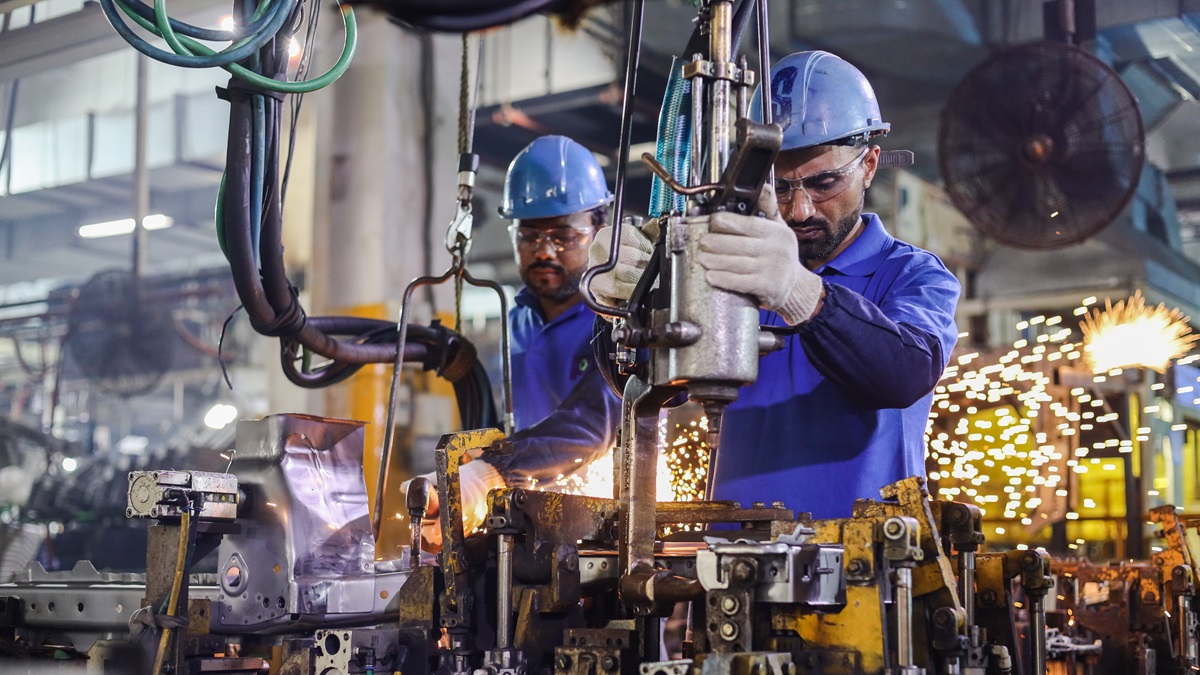The South Asian nation requires urgent investment and international support to strengthen key economic sectors and enhance their climate resilience.
© Shutterstock/SS 360 | Workers in an automobile assembly line in Karachi, Pakistan.
Facing severe climate and economic challenges, Pakistan urgently needs investment and policy support to pursue green industrialization and bolster its economy while enhancing climate resilience.
With a per capita income of $1,596, the South Asian nation hovers between the World Bank's low and lower-middle income categories. Notably vulnerable to climate change despite contributing just 0.93% of global greenhouse emissions, Pakistan ranks 150 out of 185 on the ND-GAIN Index for climate vulnerability.
In 2022, the impact of climate change was starkly evident when devastating floods submerged a third of the country’s territory, causing damages exceeding $30 billion, about 8% of its GDP.
The environmental catastrophe compounded Pakistan’s economic strains from COVID-19 and its rapidly growing external debt, which has doubled from $65 billion in 2015 to almost $130 billion (40% of GDP) in the Spring of 2023, leading to a recent bailout from the International Monetary Fund.
Providing the ‘right support’
Amid these challenges, sectors key to Pakistan's green industrialization are grappling with significant obstacles in financing, policy formulation and technology access.
“It’s critical to strengthen the country’s domestic public and private funding sources and provide the right support,” UNCTAD senior economist Gul Unal says.
She underscores the need for stronger international support, including the New Collective Quantified Goal for climate finance and the Loss and Damage Fund agreed at COP28, along with assistance from multilateral partners like the World Bank and International Monetary Fund.
A forthcoming UNCTAD study, expected in spring 2024, will offer key recommendations for Pakistan's green industrialization. Its initial findings were discussed at a recent high-level conference in Islamabad co-organized by UNCTAD and the Social Protection Resource Centre, bringing together government officials, industry leaders, financiers and researchers.
Revitalizing agriculture
Agriculture contributes nearly a quarter of Pakistan's GDP, employs about 37% of its population and supplies cotton and other raw materials that are vital for the country’s textile industry. But the sector struggles with inefficiency largely due to small-scale operations and a lack of modernization, leading to issues like food insecurity, rural unemployment and poverty.
Simplifying loan processes, reducing collateral requirements and streamlining financial services can significantly improve farmers' access to credit. This, in turn, would bolster their capacity to upscale operations and adapt better to climatic change.
Transforming the textile industry
Pakistan's textile industry employs more than 40% of the industrial workforce and accounts for 60% of the nation's exports. But it also has a big environmental footprint. The sector is responsible for over 20% of industrial water pollution, and “fast fashion” production processes are exacerbating greenhouse gas emissions and landfill waste.
The industry needs a fundamental shift towards renewable energy sources like solar, wind and hydropower. Additionally, developing innovative recycling methods and enhancing sustainability awareness and education at all levels are crucial steps for a more environmentally responsible textile industry.
Revamping the transport sector
The Transportation sector, which contributes 10% to Pakistan's GDP, faces significant challenges, notably a heavy reliance on private vehicles and a slow transition to low-carbon fuels. A primary issue is the inaccessibility of public transit systems, stemming from inadequate urban planning, which leads many people in the country reliant on private vehicles.
The country needs improved urban planning based on efficient mass transit systems. Encouraging the use of public transport, cycling and walking, along with the development of better electric vehicle infrastructure and designs, are also vital steps. Funding these initiatives could involve implementing carbon taxes, parking levies and the creation of a domestic carbon market.
Driving green transformation
The high-level conference in Islamabad and the forthcoming study are part of UNCTAD's "Resilient, green and transformative development" project, focused on countries along the Asian Belt and Road and running from 2022 to 2024.
This initiative aims to extract lessons from China's green industrialization experience, formulate integrated policy strategies for participating countries and facilitate knowledge sharing among policymakers.

